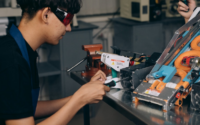Maximizing Performance and Safety: Exploring the Essential Role of Testing Equipment and Diverse Machine Testers

In today’s fast-paced world, the demand for high-quality and reliable equipment is growing exponentially. Industries such as manufacturing, construction, and technology rely heavily on the performance of their machinery and tools. To ensure that these equipment function optimally and are safe for the machine operator, testing equipment and machine testers play a crucial role. In this blog post, we will discuss the importance of testing equipment and explore the different types of equipment/machine testers available in the market.
The Importance of Testing Equipment
- Safety: Testing equipment helps ensure that machines and tools are safe to operate, minimizing the risk of accidents and injuries in the workplace. Regular testing can identify potential hazards and prevent accidents from occurring.
- Quality Assurance: Testing equipment is essential for maintaining the quality of products and services. By measuring and evaluating the performance of machinery, businesses can ensure that their products meet industry standards and customer expectations.
- Efficiency: Regular testing of equipment can help identify inefficiencies and areas for improvement. This can lead to increased productivity and cost savings for businesses.
- Compliance: Many industries have strict regulations and standards that must be met. Testing equipment helps businesses stay compliant with these regulations by ensuring that their machinery and tools meet the required specifications.
- Maintenance and Longevity: Regular testing can help identify potential issues before they become major problems, allowing for timely maintenance and repairs. This can extend the life of equipment and reduce the need for costly replacements.
A great example of this is an OTDR fiber tester for technicians working with fiber optic networks. These sophisticated devices are used to analyze and troubleshoot fiber optic cables, identifying issues such as breaks, bends, and faulty connectors to ensure reliability and longevity of the equipment being tested.
Different Types of Equipment Testers
- Electrical Testers: Electrical testers are used to test the functionality and safety of electrical equipment, such as circuit breakers, transformers, and power supplies. Examples of electrical testers include multimeters, insulation testers, and earth ground testers.
- Pressure Testers: Pressure testers are used to measure the pressure in various types of equipment, such as pipes, tanks, and hydraulic systems. Some common pressure testers include hydraulic pressure testers, pneumatic pressure testers, and digital pressure gauges.
- Vibration Testers: Vibration testers are used to measure the vibrations produced by machinery and equipment. This can help identify issues such as imbalance, misalignment, and bearing wear. Examples of vibration testers include portable vibration meters and vibration analyzers.
- Temperature Testers: Temperature testers are used to measure the temperature of equipment and materials. This can be important for ensuring that machinery is operating within safe temperature ranges and that materials are being processed correctly. Examples of temperature testers include infrared thermometers, thermocouples, and temperature data loggers.
- Material Testing Equipment: Material testing equipment is used to evaluate the properties of materials, such as strength, hardness, and durability. This can be important for ensuring that materials are suitable for their intended applications. Examples of material testing equipment include hardness testers, tensile testers, and impact testers.
With all these equipment testers, we also need to consider getting data acquisition software. Data acquisition systems are crucial in equipment testing as they enable the collection, processing, and analysis of information required to understand electrical or physical phenomena.
Data acquisition systems play a vital role in equipment testing by providing accurate and reliable data, contributing to the overall quality and safety of products and processes.
Conclusion
Testing equipment and machine testers are essential tools for ensuring the safety, efficiency, and quality of machinery and tools across various industries. By regularly testing and evaluating the performance of equipment, businesses can maintain high standards, comply with industry regulations, and ultimately save time and money in the long run. With a wide range of testers available, there is a testing solution for every type of equipment and application.


